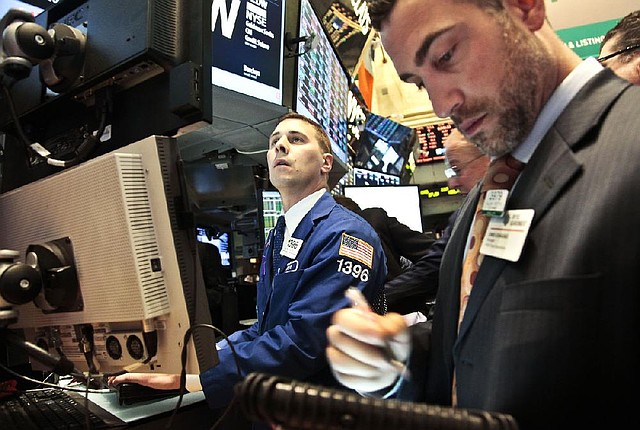HP jolt, Fed’s alarm sap stocks
Joseph Mastrolia (left), a trader with Barclays, and Chris Casaliggii, Euronext floor manager, work Tuesday on the floor of the New York Stock Exchange.
Wednesday, November 21, 2012
NEW YORK — Falling oil prices and a surprise announcement from Hewlett-Packard weighed on technology and energy stocks Tuesday.
Hewlett-Packard shares fell $1.59, or 12 percent, to close at $11.71 after executives said a company Hewlett-Packard bought for $10 billion last year lied about its finances. Chief Executive Officer Meg Whitman said that there were “serious accounting improprieties” at the search-engine company, Autonomy.
To account for it, Hewlett-Packard took an $8.8 billion charge in its latest quarter.
A warning from the Federal Reserve chairman, Ben Bernanke, about the dangers of the “fiscal cliff” also weighed on the market in afternoon trading. The Dow Jones industrial average dropped as much as 94 points shortly after Bernanke spoke.
But the stock market crept higher through the late afternoon and ended the day flat. The Dow dropped 7.45 points to close at 12,788.51. The Standard & Poor’s 500 index gained 0.92 point to 1,3827.81.
Advancing stocks outnumbered decliners by 5-to-4. Consolidated volume was a lighter-than-average 3 billion shares.
On Monday, the Dow soared 207 points as investors focused on prospects for a deal between the White House and congressional Republicans to avoid the fiscal cliff, a combination of tax increases and government spending cuts set to take effect Jan. 1 unless Congress reaches a budget deal.
In a speech Tuesday to the Economic Club of New York, Bernanke urged Congress to take action. Asked in a question-and-answer session whether the Fed could limit the economic hit posed by the budget-tightening measures, Bernanke said: “If the economy goes off the broad fiscal cliff, I don’t think the Fed has the tools to offset that.”
Many investors expect financial markets to turn turbulent when Congress returns from its Thanksgiving recess and begins bargaining with the White House.
John Linahan, head of T. Rowe Price’s U.S. equity group, said that if those negotiations stretch into late December, the stock market could resemble the wild trading of August 2011, when markets flipped from big gains one day to steep losses the next.
Energy stocks and the price of crude oil fell after the president of Egypt predicted that Israel’s week-long offensive in the Gaza Strip would end in hours and the Israeli prime minister said Israel would be a “willing partner” to a ceasefire.
Crude oil was down $2.53, or 2.8 percent, to $86.75 per barrel. It traded above $89 earlier in the day. Energy stocks in the S&P slipped 0.4 percent as a group. Tech stocks fared the worst, losing 0.6 percent.
The Nasdaq composite index gained 0.61 of a point to 2,916.68. The yield on the benchmark 10-year U.S. Treasury note rose to 1.66 percent.
Hormel Foods shares fell $1.25, or 4 percent, to $30.05 after its earnings and revenue fell below Wall Street expectations. The company said sales of Spam remained strong, and it increased its annual dividend 13 percent, to 68 cents per share.
Shares of Krispy Kreme Doughnuts climbed $1.77, or 23 percent, to $9.31 after it forecast earnings for 2013 above what Wall Street was expecting.
Business, Pages 26 on 11/21/2012
